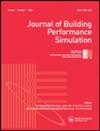Experimental and numerical analysis of CO2 transport inside a university classroom: effects of turbulent models
IF 2.3
4区 工程技术
Q2 CONSTRUCTION & BUILDING TECHNOLOGY
引用次数: 2
Abstract
ABSTRACT Carbon dioxide (CO2) can reduce cognitive abilities at higher concentrations. CO2 can be used as a proxy for gas transport in an indoor environment and as an index to determine Indoor Air Quality (IAQ). In the present work, CO2 transport inside a real university classroom has been analysed experimentally and numerically. The main novelty is related to the experimental characterization of the airflow, boundary conditions for swirl diffusers and CO2 transport occurring in an actual university classroom equipped with a Turbulent Mixing Airflow (TMA) system. The numerical methodology, validated against the experimental measurements performed by the authors, has been used to identify the most suitable turbulence model for both thermo-fluid dynamic and CO2 transport simulations. Three different RANS k-ε turbulence models have been compared: the Standard k-ε, the RNG k-ε and the Realizable k-ε. Moreover, the evacuation time and the effects of turbulent diffusivity have been analysed.大学教室内CO2输运的实验与数值分析:湍流模型的影响
高浓度的二氧化碳(CO2)会降低认知能力。二氧化碳可以作为室内环境中气体输送的代表,并作为确定室内空气质量(IAQ)的指标。在本工作中,对一个真实的大学教室内的二氧化碳传输进行了实验和数值分析。主要的新颖之处与气流的实验特性、涡流扩散器的边界条件和二氧化碳的输送有关,这些都发生在一个配备了湍流混合气流(TMA)系统的实际大学教室中。数值方法与作者进行的实验测量相对照,已用于确定最适合热流体动力学和CO2输运模拟的湍流模型。比较了三种不同的RANS k-ε湍流模型:标准k-ε、RNG k-ε和可实现k-ε。此外,还分析了疏散时间和湍流扩散率的影响。
本文章由计算机程序翻译,如有差异,请以英文原文为准。
求助全文
约1分钟内获得全文
求助全文
来源期刊

Journal of Building Performance Simulation
CONSTRUCTION & BUILDING TECHNOLOGY-
CiteScore
5.50
自引率
12.00%
发文量
55
审稿时长
12 months
期刊介绍:
The Journal of Building Performance Simulation (JBPS) aims to make a substantial and lasting contribution to the international building community by supporting our authors and the high-quality, original research they submit. The journal also offers a forum for original review papers and researched case studies
We welcome building performance simulation contributions that explore the following topics related to buildings and communities:
-Theoretical aspects related to modelling and simulating the physical processes (thermal, air flow, moisture, lighting, acoustics).
-Theoretical aspects related to modelling and simulating conventional and innovative energy conversion, storage, distribution, and control systems.
-Theoretical aspects related to occupants, weather data, and other boundary conditions.
-Methods and algorithms for optimizing the performance of buildings and communities and the systems which service them, including interaction with the electrical grid.
-Uncertainty, sensitivity analysis, and calibration.
-Methods and algorithms for validating models and for verifying solution methods and tools.
-Development and validation of controls-oriented models that are appropriate for model predictive control and/or automated fault detection and diagnostics.
-Techniques for educating and training tool users.
-Software development techniques and interoperability issues with direct applicability to building performance simulation.
-Case studies involving the application of building performance simulation for any stage of the design, construction, commissioning, operation, or management of buildings and the systems which service them are welcomed if they include validation or aspects that make a novel contribution to the knowledge base.
 求助内容:
求助内容: 应助结果提醒方式:
应助结果提醒方式:


